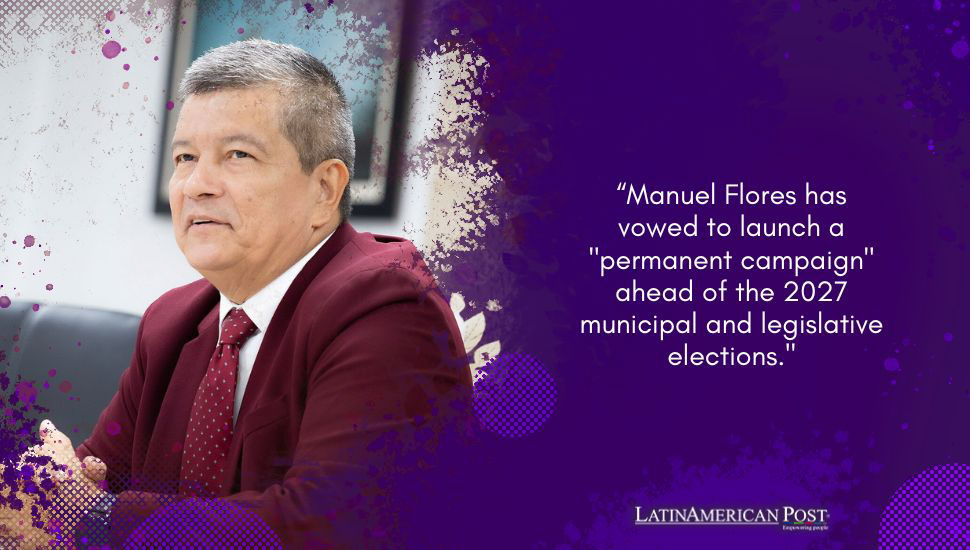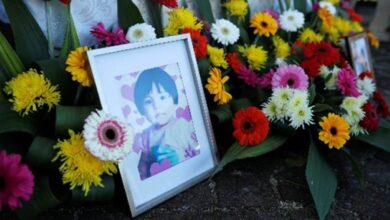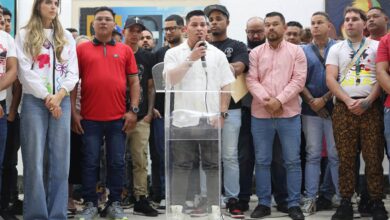Salvadorean Leftist FMLN’s Struggle in Bukele’s Shadow

Manuel Flores, the new secretary general of El Salvador’s leftist Farabundo Martí National Liberation Front (FMLN), has vowed to launch a “permanent campaign” ahead of the 2027 municipal and legislative elections.
Manuel Flores, recently elected as the new leader of El Salvador’s leftist Farabundo Martí National Liberation Front (FMLN), has declared a “permanent campaign” to prepare for the 2027 municipal and legislative elections. This declaration comes when the FMLN grapples with a significant decline in political influence, starkly contrasting the party’s former stature.
Flores was elected on Sunday, succeeding the former vice president Óscar Ortiz. “The moment is now, and from this day forward, we are in campaign mode—not just electoral campaigns, but campaigns for the right to health, water, the promotion of sports, culture, literature, and art,” Flores stated in a press conference. He promised that the FMLN would be “closer to the people,” adhere to its regulations and statutes, and not expel any members. “We declare ourselves in a permanent campaign alongside our people, alongside our militants, whom I call upon to join this effort,” he added.
The FMLN, founded in 1980 by various insurgent groups and transformed into a political party in 1992, experienced its first major political defeat in the 1994 presidential elections. However, it solidified itself as the second political force in the country by securing 21 out of 84 congressional seats that same year. After losing three consecutive presidential elections, the FMLN finally won the presidency in 2009 with journalist Mauricio Funes as their candidate, marking the first time a non-traditional party member led the FMLN.
Challenges and Setbacks
The FMLN’s rise to power continued with the election of Salvador Sánchez Cerén in 2014, the first former guerrilla commander to become president of El Salvador. However, this electoral high was followed by a significant decline, primarily due to corruption cases involving both Funes and Sánchez Cerén. The party’s internal struggles were further exacerbated in 2017 when the FMLN decided to expel Nayib Bukele, who had served as mayor of Nuevo Cuscatlán and later San Salvador, roles often seen as stepping stones to the presidency. Despite these setbacks, the FMLN has shown remarkable resilience and determination to overcome these challenges.
Bukele’s expulsion and subsequent political maneuvers substantially shifted the Salvadoran political landscape. Bukele formed the Nuevas Ideas (NI) party, which achieved a resounding victory in the 2019 presidential elections and dominated the 2021 legislative elections. The FMLN faced a crushing defeat, failing to secure any seats in the Legislative Assembly or win mayoral positions for the first time.
Flores’s declaration of a “permanent campaign” is a response to this context of continuous setbacks and Bukele’s rising popularity. The FMLN’s new leader is attempting to re-energize the party base and reconnect with the electorate by focusing on fundamental rights and cultural promotion. However, the path ahead is fraught with challenges, especially in a political environment heavily influenced by Bukele’s successes and the sweeping changes brought about by Nuevas Ideas.
Rebuilding Amidst Political Turbulence
The FMLN’s current struggle can be traced back to its origins and the historical context that shaped its rise and fall. The party was founded by insurgent groups during the civil war and transitioned into a significant political force in post-war El Salvador. Its initial successes were rooted in its unwavering commitment to social justice and addressing the needs of marginalized communities. This commitment to social justice remains at the core of the FMLN’s values, despite the challenges it has faced over time.
Under Flores’s leadership, the FMLN is embarking on a journey to rebuild the party from its core. His focus on staying close to the people and promoting essential rights and cultural values is a clear attempt to realign the party with its founding principles. This strategy, while challenging in the face of Bukele’s popularity, is a testament to the FMLN’s commitment to its roots and its determination to regain public trust.
A blend of populist rhetoric and a strongman approach to governance has characterized Bukele’s administration. His actions, including the ousting of judges and his stance on crime, have garnered both support and criticism. For many Salvadorans, Bukele represents a break from the past and promises a more secure and prosperous future. This perception poses a significant challenge for Flores and the FMLN as they attempt to present themselves as a viable alternative in a political landscape dominated by Bukele’s narrative.
The Road Ahead for FMLN
The FMLN’s journey ahead is undeniably challenging. However, Flores’s declaration of a ‘permanent campaign’ is a clear signal of the party’s recognition of the need for continuous engagement and advocacy. The FMLN’s commitment to addressing the electorate’s immediate concerns and rebuilding trust and credibility, despite past scandals and electoral defeats, is a testament to its responsiveness and determination.
Reconnecting with the youth and leveraging social media could be crucial for the FMLN’s efforts to regain relevance. Bukele’s adept use of social media to communicate directly with the public and shape his image has set a new standard for political engagement in El Salvador. The FMLN’s recognition of the need to adapt to this new reality and find innovative ways to reach and resonate with younger voters is a hopeful sign for the party’s future.
Moreover, the FMLN must demonstrate tangible results in addressing the issues that matter most to Salvadorans. This includes improving healthcare, ensuring access to clean water, and promoting education and cultural initiatives. By focusing on these areas, the FMLN can start to rebuild its image as a party that genuinely cares about the well-being of the people.
The broader regional context further complicates the FMLN’s journey. In Latin America, leftist parties have faced varying successes and challenges. The political dynamics in countries like Venezuela, Nicaragua, and Bolivia offer cautionary tales and resilience lessons for the FMLN. Understanding and navigating these regional influences will be crucial as Flores and his team work to re-establish the party’s footing in El Salvador.
A Long Road to Recovery
Manuel Flores’s call for a “permanent campaign” is a bold and necessary move for the FMLN as it seeks to recover from its recent electoral defeats and rebuild its political relevance. The challenges are immense, especially in the face of Nayib Bukele’s overwhelming popularity and the transformative changes brought about by Nuevas Ideas. However, by staying true to its core principles, addressing the immediate needs of the populace, and engaging with the youth, the FMLN can begin to carve out a new path forward.
Also read: Balancing Violence Reduction and Human Rights in El Salvador
The road to recovery will be long and arduous. Still, with dedicated leadership and a clear vision, the FMLN has the potential to become a significant force in Salvadoran politics once again. The journey will require resilience, adaptability, and a deep commitment to the values initially inspired the party’s formation. As the FMLN navigates this challenging terrain, the lessons learned from its past and the current political landscape will be crucial in shaping its future trajectory.





